Contents:
Winter is coming! This can only mean one thing…No, not a ‘Game of Thrones’-esque showdown. We’re talking about Christmas mocks.
There’s no tiptoeing around it: mock exams can be stressful and scary. There’s a lot of pressure on and a lot of work to do. When you’re staring down the barrel of the hours of revision to come, it can all feel quite daunting. How do you even get started?
Planning. The importance of preparation is frequently repeated but can’t be overstated. With different topics to tackle and not much time to do them in (plus the school day to get through), our brains need a helping hand to get it all done. A timetable can help you to split your attention equally and motivate you to meet your goals. Making a schedule is as much about drumming up some motivation as it is about providing a scaffold to fall back on.
So that’s all well and good, but how do you draw up a study planner that really works? Is there a right way to plan? Whether you loathe planning, preferring to wing it, or you’re an organisation fanatic who spends far too long crafting the perfect aesthetic calendar, you’re in the right hands. We’ve got all the tips and tricks to making a revision schedule that’s efficient and effective!
Creating your revision timetable
1. Write a list of everything you need to revise
Sounds obvious enough, right? But don’t stop once you’ve written down all the subjects you’re being examined on; break it down into specific modules, units, or topics. This reduces the task at hand into manageable chunks, giving specific focuses for each revision slot. It’ll also make things easier when it comes to prioritising.
When dividing up topics, it might be useful to refer to your course’s specification or the contents page of your course textbook. These will split the subject up for you. Plus, checking the syllabus will stop you wasting time on topics that won’t come up in the exam.
2. Prioritise your topics
Have you ever been guilty of revising a topic you know you’re comfortable with, when you know deep down that you should be focusing on another one that you’re struggling with? Yes? You’re not alone. In fact, taking the path of least resistance is an impulse that’s all too human. There’s no shame in it (it’s in our nature, after all) but it is something we need to confront when planning our revision.
Order your list of topics from those you’re least to most confident with; when it comes to constructing your timetable, schedule your hardest topics for sooner rather than later. Prioritising in this way is a crucial part of how to revise effectively.
It can be tempting to procrastinate and revise the topics you find easiest first − but leaving the hardest until last runs the risk of having insufficient time to properly understand the topic and seek advice.
Allow yourself more time to get to grips with your worst subjects − but don’t neglect the ones you’re strongest in. For example, you might decide to complete two hours on a tricky unit for every hour you spend on a more familiar one. It may feel like you know everything now, but this might not be the case by the time mocks roll around!

3. Figure out how much time you have to revise
This will vary depending on the dates of your exams. Don’t worry about calculating exactly how many hours you have: the number of days will suffice! Simply search “How many days until [insert date of exam]” online and your browser will do the rest. If you don’t yet know the exact dates, use an approximate date that should fall before your mocks start; the Sunday before mock week, for example.
If you have your exam timetable, use this with your prioritised subject list to pace your schedule, ranking the hardest and most time-sensitive topics as most urgent. If you don’t, stick with the prioritised list you already made.
4. Block out any commitments
Ensure that you put into your plan your school timetable, extracurriculars, and any other activities (e.g. meals, meeting up with friends, holidays). If there are particular days, like Saturdays or a family birthday, you want to keep entirely free of revision, make sure to build these into the plan too!
You don’t need to sacrifice relaxation completely for the sake of revision. The advantage of planning this far in advance is that you have enough time for a solid work-life balance and can hopefully ward off burnout. Having time off will improve your work in the long run. And at the end of the day, these are only mocks!
5. Compile your timetable
It’s time for the star of the show, the reason we’re all here: the schedule! Now you’ve got your non-negotiables in, you can slot in your study sessions around them.
For each subject, divide however many days you have until your first exam (minus any days you won’t be studying) by the number of topics you need to revise. This will tell you how many topics you need to revise each day. For example, if you have 60 topics and 30 days, you will need to cover two topics per day. You may also want to keep clear on the calendar a few days before each exam to refresh your subject knowledge of all topics − so remember to bear this in mind.

Remember you have the home advantage: you know how you work best. Put topics you’ll need your full attention for at the times of day when you work best. You may prefer to allocate specific time slots per subject, or you might want to allocate topic-specific tasks to each day. Whichever approach you use is completely up to you! To find out more about content-based versus time-based revision approaches, check out our top revision tips article.
Keep a healthy split between your tougher and more comfortable topics, referring back to your rankings as needed. This way you’re putting the time in where it’s needed while also reaping the benefits of some quick(er) wins. Experiencing a smooth workflow and seeing progress being made will help you build momentum and stay motivated.
6. Schedule breaks
Whether you take a time-oriented or content-oriented approach, it’s vital that you remember to take some time away from your desk. This helps you maintain focus and stops revision feeling even more like a chore.
Some studies suggest our brains can only concentrate for a maximum of 90 minutes before a 15 minute break is needed. Others put the ideal focus timescale at between 15 and 30 minutes. Again, use your insider knowledge: plan based on how long you think you can focus for.
Your breaks should be one of the most flexible parts of your timetable. Keep working until your concentration starts to fade and you’re not in your workflow anymore.
Top tips
Be flexible
It’s important to recognise that you may not always be able to complete the tasks scheduled for a given day − things will inevitably crop up. Ensure that your timetable isn’t jam-packed and can be adapted if necessary. For example, if you don’t manage to complete Monday’s tasks, there need to be some gaps in your schedule for catching up. It’s all about being realistic. A little time pressure is good, but don’t push yourself too far. We want this to be achievable!
Colour code
Colour coding allows you to see what subjects you’ll be revising on a specific day at a quick glance (as well as making your timetable look really pretty). When it comes to those inevitable rejigs, using a colour scheme will quickly highlight any topics that have been neglected and help you make effective swaps.

Refreshers
Factor in time for regular refreshers to consolidate your learning and ensure that topics covered early on aren’t forgotten. For more information on how to tailor your revision to how our brains work, check out this article on Ebbinghaus’ Forgetting Curve.
Be specific
For some students, it may be helpful to plan exactly what you intend to do in a particular session. It’s not much use knowing you need to revise “Science” between the hours of 4pm and 5pm if you don’t actually know what you should be doing during this time. What does “revise” entail? For example, “I will revise AQA biology cell structure and complete cell structure questions by topic.”
Be harsh but fair
We all have days when we’re simply not up to it. When this happens, it’s okay if you need to switch to a less intense task for the day. Getting something done is far better than not doing anything. That said, be honest with yourself: is this a one-off, letting-it-slide type situation, or are you avoiding a particularly tough subject that you really should face sooner rather than later? A timetable only works if you stick to it, so try your best to respect what past-you did for the sake of future-you.
Set goals and keep track
Use your timetable alongside other planning tools, such as tallying your hours per subject, writing a checklist of tasks to complete (e.g. a mind map and set of flashcards for every physics unit), or keeping a list of all available past papers and your attempts at them. This helps target your sessions and motivate you − who can resist the thrill of ticking that box or moving a task into the DONE column?
Making an online revision timetable
Even if you make a physical copy of your timetable, having a version available online is a good idea: you can take it with you everywhere and it’s easy to adapt. Here are some examples of online resources that can be used to make timetables:
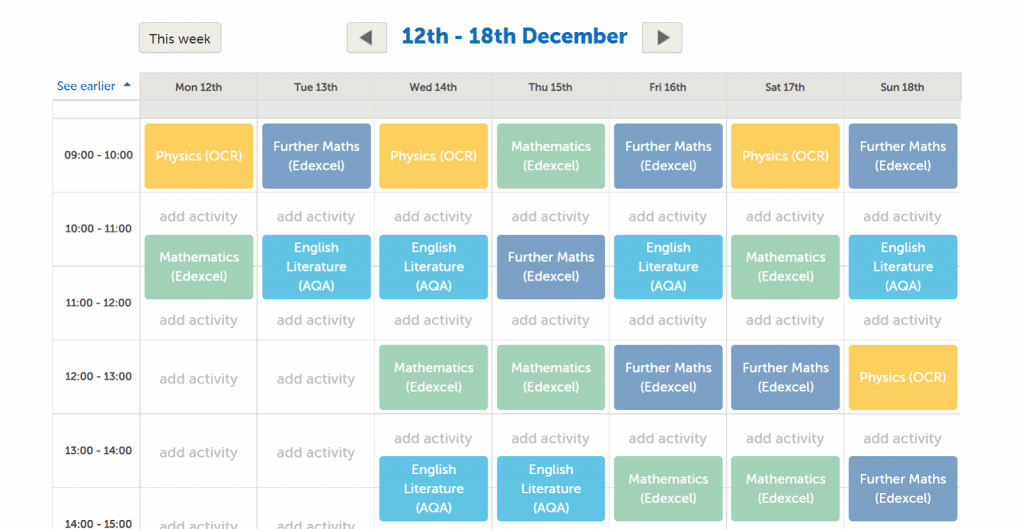
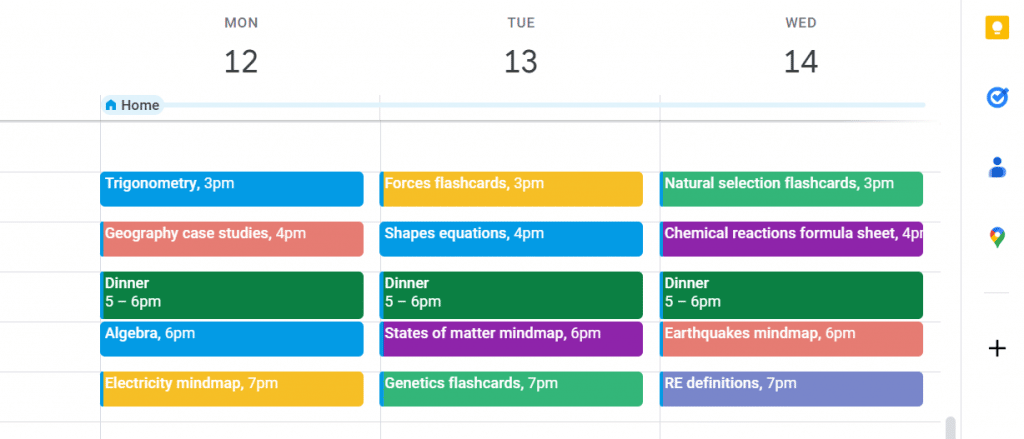
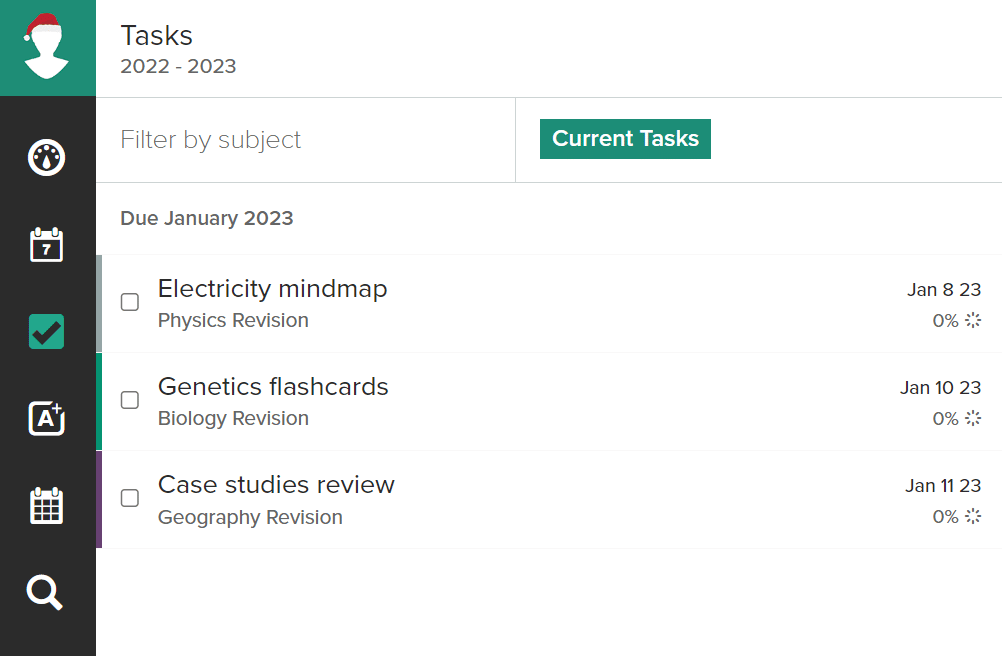
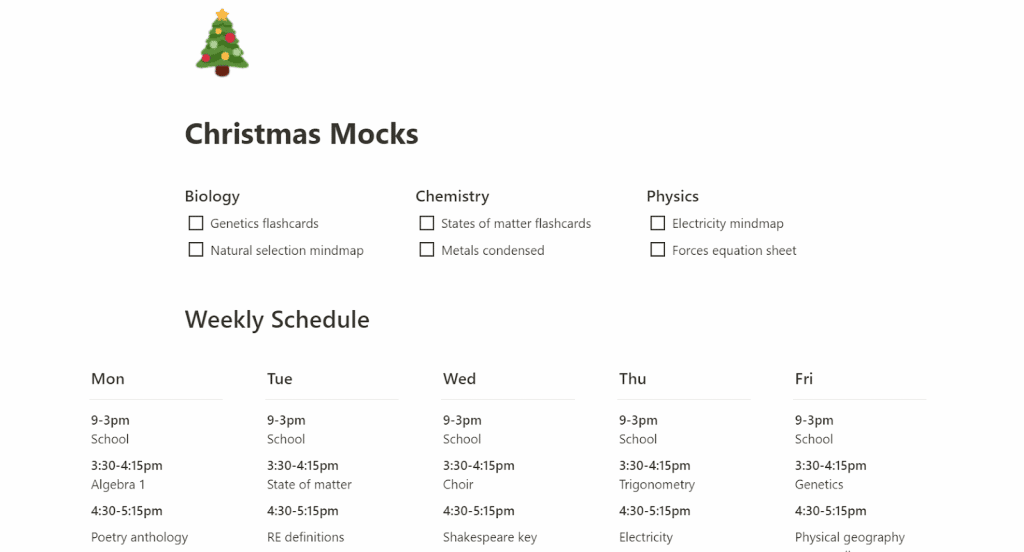
Don’t overthink your revision timetable: there’s no exact science to it. Ultimately, putting the work in is what really counts. Planning is definitely important, just don’t spend so much time making the ideal calendar that you never get round to revising!

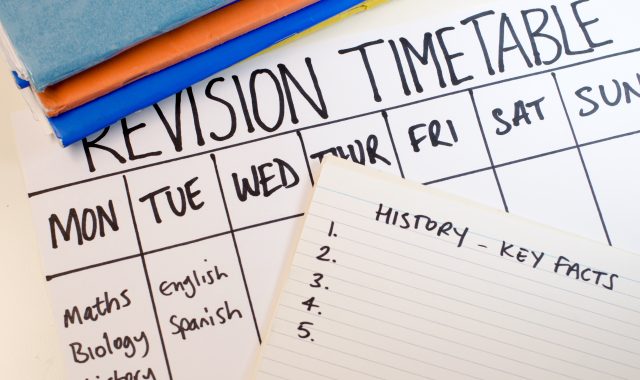






Comments